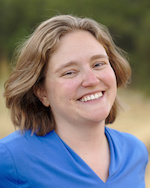UW–Madison mathematician wins prestigious Packard Fellowship
Melanie Matchett Wood, a University of Wisconsin–Madison assistant professor of mathematics whose research takes new approaches to classic questions of number theory, is one of 18 early career scientists from around the United States named a Packard Fellow for Science and Engineering.

Melanie Matchett Wood
Each fellow receives a grant of $875,000 over five years — funding they can use to explore high-risk aspects of their work in search of the sort of high-reward discoveries that expand the frontiers of their field.
“The Packard Fellowships give some of the most talented early-career scientists and engineers the flexibility to experiment, take risks and explore new ideas that they otherwise may not have the resources to do,” says Frances Arnold, professor of chemical engineering at the California Institute of Technology and chair of the Packard Fellowships Advisory Panel. “This type of investment in the nation’s best and brightest was something that David Packard believed would help to accelerate scientific breakthrough and in turn, provide many benefits to our society.”
Wood studies number theory and algebraic geometry, applying them to problems like understanding patterns in large prime numbers — numbers divisible only by themselves and 1 — and for determining how many solutions there are to any given equation with multiple variables.
“It sounds abstract, but these two areas are connected in something every one of us uses every day — the encryption systems that encode our credit card numbers and our emails and other personal information we share over computer networks,” Wood says. “It’s called elliptical curve cryptography, and it relies on really giant prime numbers and really complex equations with lots of solutions.”
“It sounds abstract, but these two areas are connected in something every one of us uses every day.”
Melanie Matchett Wood
It’s the way Wood applies modern mathematical tools to these problems that draws attention — Wood and her collaborators have “stunned the field” with recent breakthroughs on high-profile problems, says Gloria Mari-Beffa, UW–Madison math professor and department chair — and honors like the Packard Fellowship.
“This is a huge honor,” says Wood, who joined the UW–Madison faculty in 2011. “It’s a recognition that the Packard Foundation thinks the approaches we take — and new ones we may develop with their support — may have a real impact.”
The Packard grant will allow her to hire more promising, young postdoctoral researchers and graduate students in Wisconsin.
“That’s where innovation and new methods come from, from getting new minds focused on these old problems,” says Wood, who — as a high school junior in 1998 — was the first girl ever to compete for the U.S. team in the International Math Olympiad.
Wood is UW–Madison’s 16th Packard Fellowship winner. Since 1988, the Packard Foundation has awarded $362 million to support 541 scientists and engineers from 52 top U.S. universities.
Tags: mathematics



